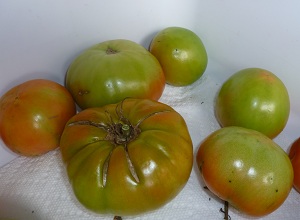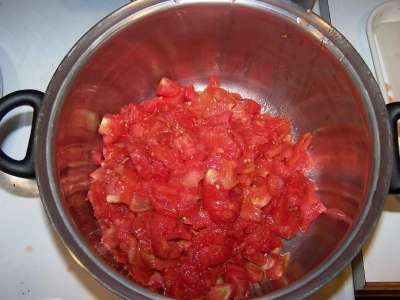
Looking for Making and Canning Homemade Salsa from Fresh Tomatoes! in 2025? Scroll down this page and follow the links. And if you bring home some fruit or vegetables and want to can, freeze, make jam, salsa or pickles, see this page for simple, reliable, illustrated canning, freezing or preserving directions. There are plenty of other related resources, click on the resources dropdown above. If you are having a hard time finding canning lids, I've used these, and they're a great price & ship in 2 days.
If you have questions or feedback, please let me know! There are affiliate links on this page. Read our disclosure policy to learn more.
Making and Canning Homemade Salsa from Fresh Tomatoes!
Making and Canning Homemade Salsa from Fresh Green Tomatoes!
Click here for a PDF print version!
If you have loads of fresh GREEN (as in unripe) tomatoes from your garden, you CAN make salsa from them. In the middle of the winter, you can have tortilla chips and your salsa and taste the summer flavor of fresh tomatoes. If you like cilantro in your salsa, see this recipe instead. Many of the photos show red tomatoes, but the green will work exactly the same.
Here's how to do it, in easy steps and completely illustrated. This method is so easy, ANYONE can do this! It's a great thing to do with your kids!
Ingredients
- Tomatoes - about 15 lbs (yes, quite a few - you remove the skins, seeds and a lot of the water, so it takes a lot to start.) You will need about 3 quarts of prepared chopped tomatoes. You can use unripe, green tomatoes, ripe tomatoes of a mixture. This makes about 8 pints of salsa! If you only want to make a single jar, see this page instead!
- Salsa mix or your own seasonings. The Ball salsa mix sells for about $2.00 to $4.00 per packet. A packet will make about a 7 pint jars. See step 7 below for seasonings.
- 2 cups Lemon juice (if you make your own seasoning) or vinegar (if you use the Ball or Mrs. Wages mixes)
Equipment
- 1 water bath canner (a huge pot to sanitize the jars after filling (about $30 to $35 - $30 at mall kitchen stores and local "big box" stores. Note: we sell canners, supplies and kits through our affiliates: click here or see the bottom of this page) Tomatoes are on the border between the high-acid fruits that can be preserved in a boiling-water bath and the low-acid fruits, vegetables and meats that need pressure canning.
- Pint (or smaller) canning jars (Ball or Kerr jars can be found at Publix, Kroger, Safeway and local "big box" stores - about $13 per dozen 8-ounce jars, more for quilted design or larger jars, including the lids and rings).
- Lids - thin, flat, round metal lids with a gum binder that seals them against the top of the jar. They may only be used once.
- Rings - metal bands that secure the lids to the jars. They may be reused many times.
- Jar grabber (to pick up the hot jars)
- Lid lifter (I like the lid rack that holds 12 lids or you can pull them out one at a time with the lid-lifter that has a magnet from the almost-boiling water where you sanitize them. ($4 at mall kitchen stores and local "big box" stores, but it's usually cheaper online from our affiliates)
- 1 large pot.
- Large spoons and ladles,
- Jar funnel ($3-Grocery stores, like Publix, Kroger and Safeway and local "big box" stores; sometimes even hardware stores)
Process - How to Make Salsa from Fresh Green Tomatoes
Step 1 - Selecting the tomatoesIt's fun to go pick your own and you can obviously get better quality tomatoes! At right is a picture of tomatoes from my garden - they are so much better than anything from the grocery store. You can use any variety, and they can be green, red or in between. Also, you don't want mushy, bruised or rotten tomatoes! |
|
||||||||||||||||||||
Step 2 - Removing the tomato skinsHere's a trick you may not know: put the tomatoes, a few at a time in a large pot of boiling water for no more than 1 minute (30 - 45 seconds is usually enough) then.... |
 |
||||||||||||||||||||
 |
Plunge them into a waiting bowl of ice water.
This makes the skins slide right off of the tomatoes! If you leave the skins in, they become tough and chewy in the sauce, not very pleasant. |
||||||||||||||||||||
Step 3 - Removing seeds and waterAfter you have peeled the skins off the tomatoes, cut the tomatoes in half. Now we need to remove the seeds and excess water. |
 |
||||||||||||||||||||

|
Step 4 - Squeeze of the seeds and waterJust like it sounds: wash your hands then squeeze each tomato and use your finger or a spoon to scoop and shake out most of the seeds. You don't need to get fanatical about it; removing just most will do. Another way to do it is to cut each tomato in half, across it, instead of lengthwise. Then just shake the seeds and juice out.
|
||||||||||||||||||||
Step 5 - Drain and dice the tomatoesToss the squeezed (Squozen? :) tomatoes into a colander or drainer, while you work on others. This helps more of the water to drain off. You may want to save the liquid: if you then pass it through a sieve, screen or cheesecloth, you have fresh tomato juice; great to drink cold or use in cooking! Next chop them up - I like 1/2 inch size cubes. You will need about 3 quarts of peeled, cored, chopped tomatoes |
 |
||||||||||||||||||||
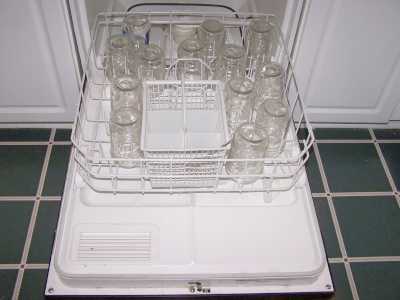 |
Step 6 - Get the jars and lids sanitizingThe dishwasher is fine for the jars; especially if it has a "sanitize" cycle. I get that going while I'm preparing everything else, so it's done by the time I'm ready to fill the jars. Be sure to let it go through the rinse cycle to get rid of any soap!
|
||||||||||||||||||||
|
Lids: Put the very hot (but not quite boiling; around 180 F, steaming water is fine) Note: everything gets sanitized in the water bath (step 7) anyway, so this just helps to ensure there is no spoilage later!)
|
 |
||||||||||||||||||||
Step 7. Mix or your own seasoning?Either works equally well. The salsa mix for canning has the advantage of being tested and easy. It's basically corn starch, onion powder, salt and seasoning. It doesn't have any preservative to improve the canning, so the advantage is only that it is easier. However, I like my custom-made from fresh seasonings better, so here is the recipe for that: I use an electric chopper (food processor) to dice the seasonings fairly fine, about 1/8 inch cubes.
|
|
||||||||||||||||||||
|
|
Step 8 - Mix ingredients in the pot and bring the sauce to a gentle simmer<-- Start with the chopped tomatoes in the pot... |
||||||||||||||||||||
|
Add the seasonings and bring to a gentle simmer, just to get it hot (180 F, if you have a thermometer) there's no need to cook it; only to get it hot enough to ready it for water bath processing to kill any bacteria and enzymes.. Reduce heat and simmer for 30 minutes, stirring occasionally.
Taste it as it cooks. If you like the sauce hotter, add 1 teaspoon of chili powder. |
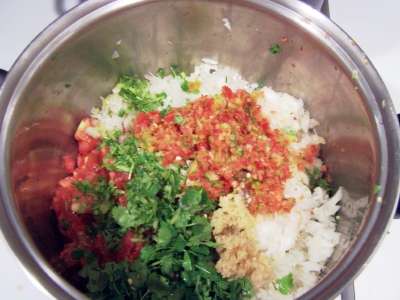
|
||||||||||||||||||||
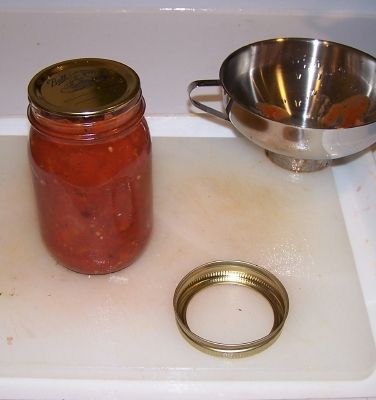 |
Step 9 - Fill the jars with sauces and put the lid and rings onFill them to within 1/4-inch of the top, seat the lid and hand-tighten the ring around them. Be sure the contact surfaces (top of the jar and underside of the ring) are clean to get a good seal! |
||||||||||||||||||||
Step 10 - Boil the jars in the cannerPut them in the canner and keep them covered with at least 1 to 2 inches of water. Keep the water boiling. Process the jars in a boiling-water bath for:
IMPORTANT: I prefer a Pressure Canner or a taller water bath canner, shown at right - To order one, see the bottom of this page or Canning supplies! |
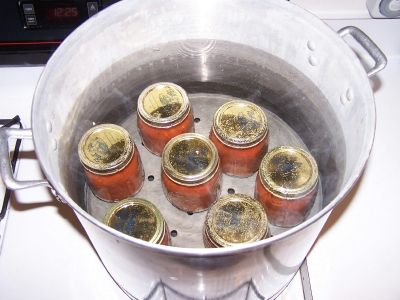 |
||||||||||||||||||||
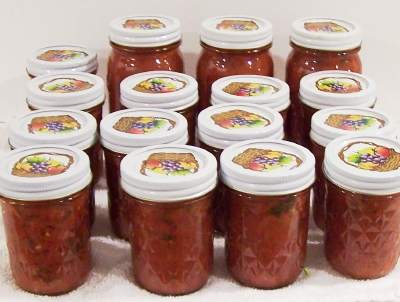 |
Step 9 - DoneLift the jars out of the water and let them cool without touching or bumping them in a draft-free place (usually takes overnight) You can then remove the rings if you like, but if you leave them on, at least loosen them quite a bit, so they don't rust in place due to trapped moisture. Once the jars are cool, you can check that they are sealed verifying that the lid has been sucked down. Just press in the center, gently, with your finger. If it pops up and down (often making a popping sound), it is not sealed. If you put the jar in the refrigerator right away, you can still use it. Some people replace the lid and reprocess the jar, then that's a bit iffy. If you heat the contents back up, re-jar them (with a new lid) and the full time in the canner, it's usually ok.
|
||||||||||||||||||||
|
Adapted from the USDA/UGa National Center for Home Food Preservation's recipe |
|||||||||||||||||||||
Other Equipment:From left to right:
|
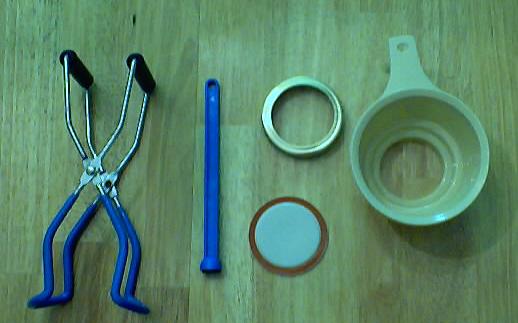 |
||||||||||||||||||||
Summary - Cost of Making Homemade Salsa - makes 9 pints |
||||
| Item | Quantity | Cost in 2025 | Source | Subtotal |
| Tomatoes | 15 to 20 lbs (to make about 12 cups (3 quarts) of prepared tomato) | free from the garden, or $0.50 cents at a PYO | Garden | $0.00 |
| Canning jars (pint size, wide mouth), includes lids and rings | 9 jars | $8.00/dozen | Grocery stores, like Publix, Kroger and Safeway and local "big box" stores; sometimes Big Lots and even hardware stores | $6.00 |
| seasonings | See step 7 | $2.00? | Grocery stores, like Publix, Kroger and Safeway and local "big box" stores | $2.00 |
| Salsa mix | 1 packet | $4.00 per package | Grocery stores, like Publix, Kroger and Safeway and local "big box" stores; sometimes Big Lots and even hardware stores | |
| Total | $8.00 total or about $0.95 per pint INCLUDING the jars - which you can reuse! |
|||
|
* - This assumes you already have the pots, pans, ladles,, and reusable equipment. Note that you can reuse the jars! Many products are sold in jars that will take the lids and rings for canning. For example, Classico spaghetti sauce is in quart sized jars that work with Ball and Kerr lids and rings |
||||
 |
Home Canning KitsThis is the same type of standard canner that my grandmother used
to make everything from applesauce to jams and jellies to tomato and
spaghetti sauce. This complete kit includes everything you need and lasts
for years: the canner, jar rack, Jar grabber tongs, lid lifting wand, a
plastic funnel, labels, bubble freer, and the bible of canning, the Ball
Blue Book. It's much cheaper than buying the items separately. You will never need anything else except jars & lids! To see more canners, of different styles, makes and prices, click here!For
more information and current pricing: |
Answers to Common Questions
What did I do wrong if my jars spoil?
Tomatoes are a borderline acid / low acid fruit (see this page about tomato acidity for more information) - adding lemon juice helps, processing according to the specified times (determined by the USDA) in the water bath canner, or better still, using a Pressure Canner almost eliminates spoilage. If you don't have a Pressure Canner, you must boost the acid level of the sauce, by adding 2 tablespoons of lemon juice or 1/2 teaspoon of citric acid per quart of sauce. (or half that, for pint jars)
Probably not. According to the USDA's National Center for Home Food Preservation:
"Salsas are usually mixtures of acid and low-acid ingredients; they are an example of an acidified food. The specific recipe, and sometimes preparation method, will determine if a salsa can be processed in a boiling water canner or a Pressure Canner. A process must be scientifically determined for each recipe. "
The USDA does accept that if you take an approved, tested recipe and make minor alterations to ingredients that does affect the preserving properties, that should be ok. But there are a lot of if's in that statement. For example, substituting 1 teaspoon of ground chili spice for 1/2 teaspoon of ground black pepper is probably fine, but substituting 1 cup of apple juice for 1 cup of lemon juice would not be. Unless you really know what you're doing, you should probably stick to the approved recipes. The preserving recipes I publish, like the one above, are all from the USDA, universities or established canning authorities. Granny probably never did lab cultures and bacteria counts to test that her recipe was safe; you were her test guinea pig, and that's not as reliable as a culture (next time you might get sick)
Here are some Salsa Guidelines from Penn State University:
- Do not substitute vinegar for lemon juice, but you can substitute lemon juice for vinegar. Lemon juice is more acidic.
- Do not reduce the amount of lemon juice or tomatoes.
- Do not add extra peppers, onions, or garlic. You can reduce the amount of peppers, onions, or garlic.
- Canned chilies may be used in place of fresh.
- You can substitute one type of pepper for another. For example, hot jalapeno peppers, bell peppers, yellow peppers, banana peppers, chili peppers and cubinal peppers may all be substituted 1 for 1.
- The key is not increasing the amount of low acid ingredients in relation to the amount of high acid ingredients
My question is about salsa. I was going to borrow a pressure cooker to
make salsa this year (for the first time). My grandma told me that I didn't need
the pressure cooker, I could just make salsa using the "inversion" method like I
did the blueberry jam. Can I do this?
Well, Grandma may be sweet, but a lot of her generation died of cancer from
smoking, heart attacks from eating too much saturated fat... And food poisoning!
:) Jam should get 5 minutes in the boiling water bath, too.
Tomatoes have enough acid to require only a water bath for processing; but by
the time you add the other ingredients which have no acidity, you've got a food
that can spoil easily. That's why most salsa recipes include a couple of cups of
vinegar or lemon juice (both very acidic).
Even so, a Pressure Canner affords greater safety that a boiling water bath, and
is more versatile. But if you follow my recipe and use vinegar or lemon juice as
stated in the recipe, the boiling water bath will work fine.
And let Grandma make the cookies rather than the preserves! :)
Coments and feedback
Comments from a visitor on September 15, 2011: "I made your salsa recipe last
night and we LOVED it! I look forward to canning some for the winter! Thank you
for sharing! (I never removed tomato seeds/water when I make spaghetti sauce
until reading your site. It cut my cooking time and I can't wait to taste the
new, thicker sauce!) "
Remember to ALWAYS call the farm or orchard BEFORE you go - weather, heavy picking and business conditions can always affect their hours and crops!
PYO Farms in Other Countries: [ Australia ] [ Canada ] [ South Africa ] [ New Zealand ] [ United Kingdom ]
Our other free, informative sites you may like:
EHSO.com - Environmental health and safety information and guidance for the
home
ConsumerFraudReporting.org - Information about identity theft, frauds and
scams; how to report them and how to protect your identity.
FitnessAndHealthScience.org - Practical fitness, health and diet information
that works.
And our other related
websites!
Care to Donate to help me keep the website going? Donate to me at Benevia here:
Use the feedback form for questions, comments and
feedback about farms - Use this
form suggest a farm to add to the website?
Or as a
last result (I reply to the forms FIRST),write me at
![]()
All images and text Copyright ©
Benivia, LLC 2004 - 2012 All rights reserved.
Disclaimer
and Privacy Policy
Permission is given to link to any page on
www.pickyourown.org Do NOT copy and republish this page in whole or part, that is a copyright violation which will be prosecuted: link to the page instead!
Looking for
jobs on farms? Farmers:
If you'd like to
advertise or have your own web page(s), click here!
Remember to ALWAYS call the farm or orchard BEFORE you go - weather, heavy picking and business conditions can always affect their hours and crops!
PYO Farms in Other Countries: [ Australia ] [ Canada ] [ South Africa ] [ New Zealand ] [ United Kingdom ]
Our other free, informative sites you may like:
EHSO.com - Environmental health and safety information and guidance for the
home
ConsumerFraudReporting.org - Information about identity theft, frauds and
scams; how to report them and how to protect your identity.
FitnessAndHealthScience.org - Practical fitness, health and diet information
that works.
And our other related
websites!
Care to Donate to help me keep the website going? Donate to me at Benevia here:
Use the feedback form for questions, comments and
feedback about farms - Use this
form suggest a farm to add to the website?
Or as a
last result (I reply to the forms FIRST),write me at
![]()
All images and text Copyright ©
Benivia, LLC 2004 - 2012 All rights reserved.
Disclaimer
and Privacy Policy
Permission is given to link to any page on
www.pickyourown.org Do NOT copy and republish this page in whole or part, that is a copyright violation which will be prosecuted: link to the page instead!
Looking for
jobs on farms? Farmers:
If you'd like to
advertise or have your own web page(s), click here!
Remember to ALWAYS call the farm or orchard BEFORE you go - weather, heavy picking and business conditions can always affect their hours and crops!
PYO Farms in Other Countries: [ Australia ] [ Canada ] [ South Africa ] [ New Zealand ] [ United Kingdom ]
Our other free, informative sites you may like:
EHSO.com - Environmental health and safety information and guidance for the
home
ConsumerFraudReporting.org - Information about identity theft, frauds and
scams; how to report them and how to protect your identity.
FitnessAndHealthScience.org - Practical fitness, health and diet information
that works.
And our other related
websites!
Care to Donate to help me keep the website going? Donate to me at Benevia here:
Use the feedback form for questions, comments and
feedback about farms - Use this
form suggest a farm to add to the website?
Or as a
last result (I reply to the forms FIRST),write me at
![]()
All images and text Copyright ©
Benivia, LLC 2004 - 2012 All rights reserved.
Disclaimer
and Privacy Policy
Permission is given to link to any page on
www.pickyourown.org Do NOT copy and republish this page in whole or part, that is a copyright violation which will be prosecuted: link to the page instead!
Looking for
jobs on farms? Farmers:
If you'd like to
advertise or have your own web page(s), click here!
